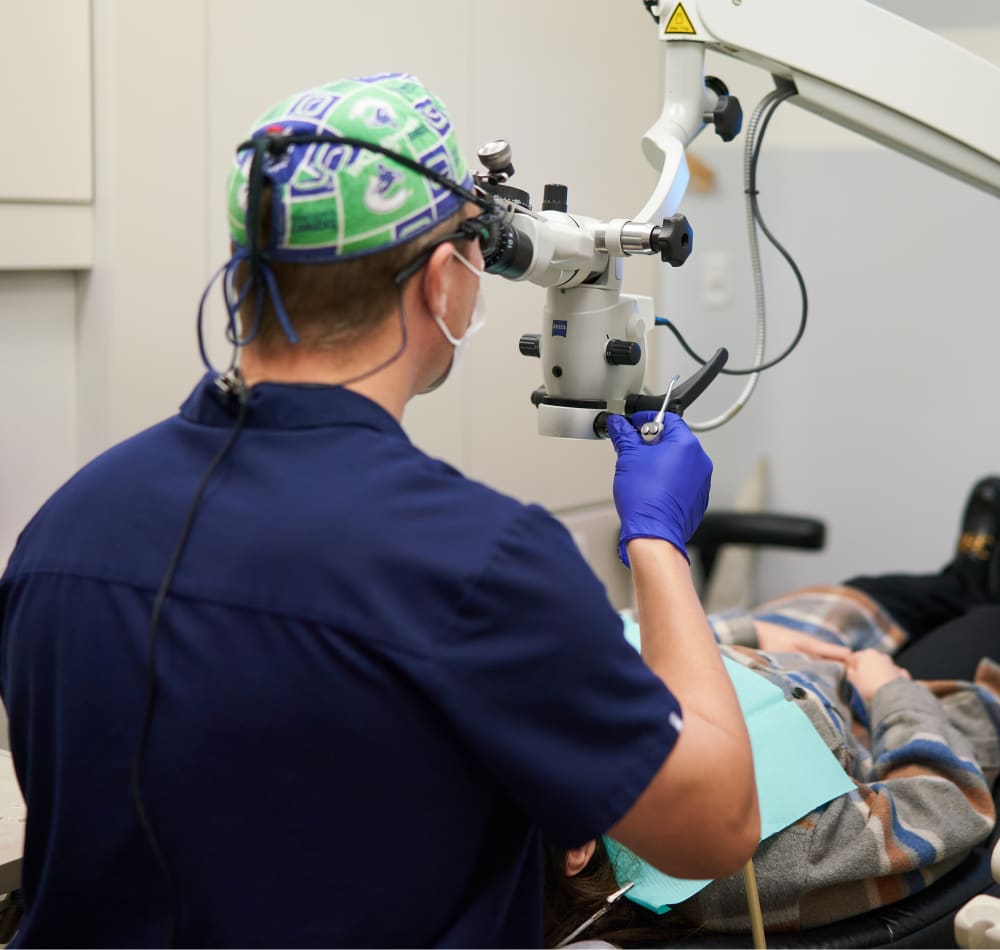
Extractions to Restore Pain Free Oral Health
Impacted wisdom teeth can lead to pain, overcrowding, tooth decay and gum disease. If you are experiencing pain or oral health issues due to erupting wisdom teeth, a wisdom tooth extraction may be the best approach for restoring your oral health.
Based on extensive pre-operative and post-operative instructions, medication coverage, IV sedation, use of special blood proteins for healing (PRF), sterile surgical protocol, and effective surgical skills, patients often feel marked improvement in their oral health within the first 48 hours following surgery.
Of course, with any surgery, one can expect some mild discomfort and swelling within the first day, but we do our best to minimize this. Wisdom teeth removal happens hundreds of times each day helping to provide relief to people suffering from impacted wisdom teeth.
If your wisdom teeth are causing you discomfort, book an appointment with our dentists in Vancouver to determine if your oral health could benefit from a wisdom tooth extraction.
Wisdom Tooth Removal FAQs
Read our most frequently asked questions about wisdom teeth removal at Oceanfront Dental in Vancouver.
-
What are wisdom teeth?
Wisdom teeth are the third and final set of molars that will erupt in the lower and upper jaw.
-
What is an impacted wisdom tooth?
If your jaw is too small to accommodate your wisdom teeth, meaning there isn't enough space for this final set of molars to break through the gums properly, they become impacted. This lack of space means that your wisdom teeth put pressure on the gums and other teeth. Pressure caused by the impacted wisdom teeth can lead to pain and infection.
Varying degrees of wisdom tooth eruption indicate that your wisdom teeth are impacted, including:
- Wisdom teeth growing in at an angle toward your second molar
- Wisdom teeth erupting at an angle toward the back of your mouth
- Wisdom teeth lying flat, aligned with your jawbone
- Wisdom teeth remaining upright but staying trapped below your gums or jawbone
-
When do wisdom teeth come in?
Although most people get their wisdom teeth between 18 and 24, it can occur earlier or later.
-
Does everyone have wisdom teeth?
You would think that everyone is born with wisdom teeth, but in truth, some people have two, three or all four wisdom teeth while others don’t have any.
-
Why do I need my wisdom teeth removed?
If your wisdom teeth are impacted, if there is not enough room in your jaw for them to grow in properly, or if you have difficulty reaching them with your toothbrush to clean them properly, it may be a good idea to have them removed. Otherwise, your other teeth may become overcrowded, or you may begin to develop infections, tooth decay and gum disease in the area.
-
What is the wisdom teeth removal procedure?
Your dentist or an oral surgeon can extract wisdom teeth at either the surgeon’s or the dentist’s practice. You may also have the procedure in the hospital, which may be something to consider if you are older or if you having all four removed at the same time. If you are in the high-risk category for complications, ask Dr. Seddon if a hospital stay is necessary.
Before wisdom tooth surgery, your dentist will numb the area with a local anesthetic. Your dentist may decide to use a local anesthetic, which puts you to sleep during the procedure, if the tooth or teeth are severely impacted or if all four are being pulled at the same time.
During your wisdom teeth removal surgery, the gum tissue will be opened up over the tooth to remove any bone that may be covering the tooth. Once the connecting tissue has been separated, the wisdom tooth or teeth will be removed. After the wisdom teeth surgery, removable or dissolvable stitches may be needed to heal the sockets.
-
Is it painful to get wisdom teeth removed?
Some discomfort should be expected right after your wisdom tooth removal, but most patients find that over-the-counter pain medications are sufficient for alleviating this discomfort. If necessary, your dentist may issue a prescription medication for pain.
-
What is the wisdom teeth removal recovery time?
You will feel some pain and discomfort after the procedure, which should subside about a week or so after your wisdom teeth removal procedure. If symptoms persist, call Oceanfront Dental immediately.
Signs You May Need Your Wisdom Teeth Removed
If your wisdom teeth are causing any of the following symptoms, extraction may be the best option:
- Bleeding or tender gums
- Swollen or red gums
- Wisdom teeth pain
- Jaw pain or swelling
- Bad breath
- Bad taste in mouth
The only way to know if you need wisdom teeth surgery is to schedule an appointment with Oceanfront Dental. Dr. Seddon and his team can examine your teeth to determine what needs to be done and if it is necessary to remove wisdom teeth or not.
